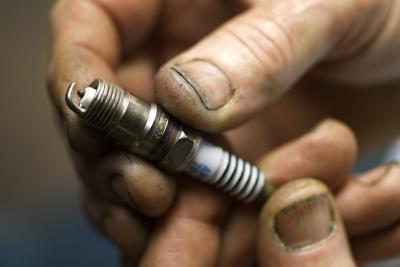
In 1996, the U.S. government passed a law requiring all vehicles to change to the OBD-II onboard diagnostics system, which standardized the system to illuminate a "Check Engine" light any time the vehicle's emissions exceed 1.5 times the federal standards. Prior to this law change, the systems monitored mechanical and electrical functions of the vehicle and only illuminated a malfunction light when there was a mechanical or electrical problem. Though often forgotten, the spark plugs play an integral part of regulating your vehicle's emissions.
The ignition system is responsible for burning virtually all of the fuel that enters the combustion chamber. There is always a small amount of raw fuel that escapes through the exhaust, and federal emission standards allow for this. The ignition system also burns harmful gases from the crankcase introduced into the combustion chamber via the PCV system. This prevents these gases from entering the atmosphere and increasing the vehicle's harmful emissions.
The spark plugs play a key role in the burning of fuel and harmful crankcase gases. The spark plug takes the electrical charge created by the ignition system and forces it to jump a gap. When the charge jumps this gap, it creates the spark needed to ignite the fuel and air mixture in the combustion chamber.
If the spark plugs cannot create a spark hot enough to burn all of the fuel in the combustion chamber, harmful emissions increase and the "Check Engine" light turns on.
Rectifying the problem does not always involve replacing the spark plugs. If a substance coats the spark plugs -- called fouling -- you may be able to remove the spark plugs, clean them off with solvent or sandpaper, adjust the gap and reinstall them. This is especially helpful in cars that use expensive iridium- or platinum-tipped spark plugs.
If the spark plugs are worn out due to age, the only way to rectify the problem is to replace them. You can identify excessively aged spark plugs by checking the gap between the ground and center electrodes. If the gap is out of specification, it is time to change the plugs.
Keep in mind that if your vehicle constantly fouls spark plugs, there is an underlying problem or problems causing this. There are four main causes of spark plug fouling: incorrect air-fuel mixture, burning oil, preignition and cold spark. Check your vehicle for these problems, if it continually fouls spark plugs, and repair it as soon as possible to prevent additional problems.